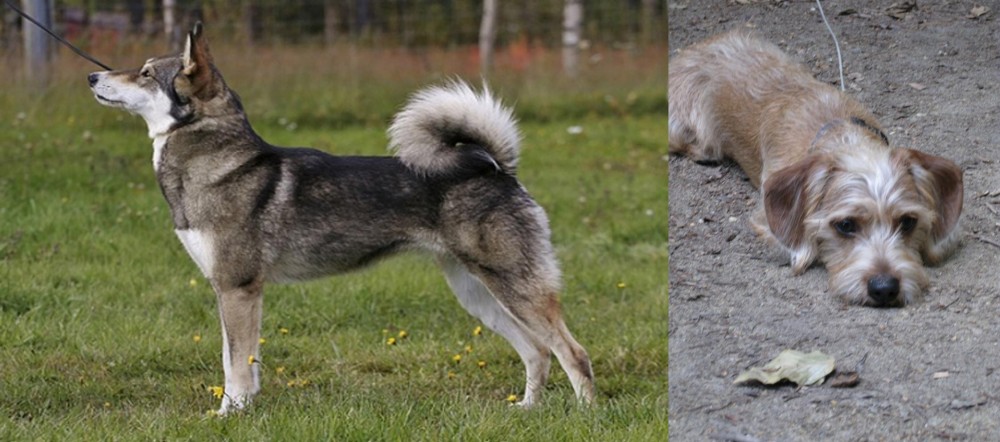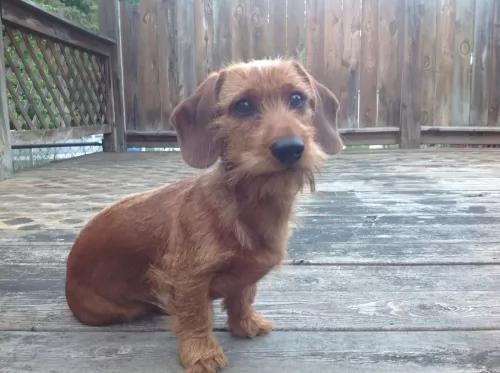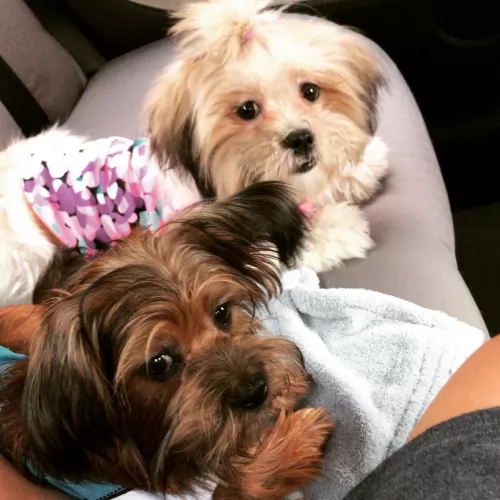 Petzlover
Petzlover East Siberian Laika is originated from Russia but Schweenie is originated from United Kingdom. East Siberian Laika may grow 16 cm / 7 inches higher than Schweenie. East Siberian Laika may weigh 15 kg / 34 pounds more than Schweenie. Both East Siberian Laika and Schweenie has same life span. East Siberian Laika may have more litter size than Schweenie. East Siberian Laika requires Moderate Maintenance. But Schweenie requires Low Maintenance
East Siberian Laika is originated from Russia but Schweenie is originated from United Kingdom. East Siberian Laika may grow 16 cm / 7 inches higher than Schweenie. East Siberian Laika may weigh 15 kg / 34 pounds more than Schweenie. Both East Siberian Laika and Schweenie has same life span. East Siberian Laika may have more litter size than Schweenie. East Siberian Laika requires Moderate Maintenance. But Schweenie requires Low Maintenance
 The East Siberian Laika Is a Russian dog developed for hunting in Siberia. The breed is a spitz type and good hunting large or small prey. It hunted squirrels and grouse as well as moose, mountain lions and bears. In the cold, snowy Siberia it was also a sled dog. There are four types of Russian Laikas: the West Siberian Laika, the Karelo-Finnish Laika, the East Siberian Laika and the Russo-European Laika.
The East Siberian Laika Is a Russian dog developed for hunting in Siberia. The breed is a spitz type and good hunting large or small prey. It hunted squirrels and grouse as well as moose, mountain lions and bears. In the cold, snowy Siberia it was also a sled dog. There are four types of Russian Laikas: the West Siberian Laika, the Karelo-Finnish Laika, the East Siberian Laika and the Russo-European Laika.
Dog from the Evenki National Territory, the Lake Baikal region, the Maritime Territory, the Irkutsk Province, and the Amur River basin were the breeding groups from which the East Siberian Laika developed. In 1947 the East Siberian Laika was designated as a separate breed from the other Laikas. All 4 Laikas were registered as separate breeds at the All -Union Cynological Congress. Biologist K.G. Abramov is credited with developing the first standard for the breed.
The breed is recognized by the American Canine Association, Inc (ACA), the Dog Registry of America (DRA) as well as the FCI. They are not recognized by the UKC or the AKC. Only the government breeds the East Siberian Laika in Russia.
 The Schweenie is a hybrid dog, with the parent breeds being the Shih Tzu and the Dachshund.
The Schweenie is a hybrid dog, with the parent breeds being the Shih Tzu and the Dachshund.
The Schweenie dog has been around for about 4 decades when breeders were looking for a dog that would be free of the health issues of the purebred parent breeds.
Because the Schweenie is a mix breed, it doesn’t qualify to be part of the American Kennel Club. He is however recognized by the Designer Breed Registry and some other clubs.
 Within the East Siberian Laika there are several different types, but two important ones are the Evenki and Irkutsk. Of all the Laikas, the East Siberian is the most diverse in physique and in color. It is a rangy dog, heavy boned and proportionately appears square. It has triangular, erect ears and a tail that curves over his back. The shape of his head can vary within the regions and the types.
Within the East Siberian Laika there are several different types, but two important ones are the Evenki and Irkutsk. Of all the Laikas, the East Siberian is the most diverse in physique and in color. It is a rangy dog, heavy boned and proportionately appears square. It has triangular, erect ears and a tail that curves over his back. The shape of his head can vary within the regions and the types.
 The Schweenie will be a smallish dog standing at roughly 27cm to 50cm and weighing 4 – 9kg.
The Schweenie will be a smallish dog standing at roughly 27cm to 50cm and weighing 4 – 9kg.
Because of the Dachshund parent, he will likely have a long body. The coat is shortish to medium length and can be a variety of colors – from a rusty color to brown, black, grey and even a cream shade. The ears are floppy and the tail medium length.
He is a small dog who is smart and bright and who wants to please his human owners. He loves people and wants to be around them and involved in their activities.
Small and cute though he is, he can be a stubborn dog and become a little big aggressive too if he is feeling a bit moody. He will need to be trained and socialized if you want him to obey your simple commands such as sit, stay, lie down and come.
He is intelligent enough to learn these simple commands with ease.He is both alert and vigilant, and this makes them good watchdogs.
 The East Siberian Laika is bred to hunt and hunt large prey as well as small. For this reason, he usually doesn’t get along well with other dogs or other large predators. Other wise he is a calm; well-mannered dog and he can be a very good watch dog. They are very trainable and make great companion dogs.
The East Siberian Laika is bred to hunt and hunt large prey as well as small. For this reason, he usually doesn’t get along well with other dogs or other large predators. Other wise he is a calm; well-mannered dog and he can be a very good watch dog. They are very trainable and make great companion dogs.
The East Siberian Laika is the calmest and quietest of the four Russian Laikas. They are very affectionate and loyal to their families. They love to walk, jog, hike, run or camp with their family.
 The Schweenie can be somewhat reserved and they need exercise regularly as well. If they don’t get enough exercise, they tend to become jittery and this can make them become a bit snappy. The are more prone to be snappy and aggressive with children who haven’t been taught how to treat animals gently and with respect.
The Schweenie can be somewhat reserved and they need exercise regularly as well. If they don’t get enough exercise, they tend to become jittery and this can make them become a bit snappy. The are more prone to be snappy and aggressive with children who haven’t been taught how to treat animals gently and with respect.
They’re small enough to adjust to life in the city or countryside but will still need to be exercised.
The little Schweenie, with the right kind of owner can become a great little pet and companion.
 Besides injures related to hunting, the East Siberian Laika is prone to several other conditions including dysplasia and:
Besides injures related to hunting, the East Siberian Laika is prone to several other conditions including dysplasia and:
The contents of the dog’s abdomen come through the abdominal wall at the umbilicas. They are surgically repaired.
 With good care, your Schweenie can live to be 12 to 15 years of age. Every dog, no matter how healthy, can get some of the health problems that plague many dogs.
With good care, your Schweenie can live to be 12 to 15 years of age. Every dog, no matter how healthy, can get some of the health problems that plague many dogs.
This is where the cushions between each vertebra come into contact with the spinal cord. It can result in nerve damage and sometimes even paralysis. Because the Shih Tzu is one of the parent breeds, you will need to be aware of this ailment as these dogs are more susceptible to this disease.
Hypoglycemia is fairly common in small dogs and it is where there is a drop in blood sugar. It can be brought on by stress. It can also be referred to as low blood sugar and it can be deadly. If your pet is hypoglycemic, you will notice a loss in appetite, extreme lethargy, trembling and unusual behavior. You will need to get your Schweenie to the vet immediately for tests and treatment.
 This is an active, working dog and should be fed accordingly. Probably 1.5-2 cups of high quality dry dog food, two times a day.
This is an active, working dog and should be fed accordingly. Probably 1.5-2 cups of high quality dry dog food, two times a day.
The East Siberian Laika is an ancient breed and fairly healthy though prone to dysplasia:
The hip socket is not formed correctly, and the bone cannot fit properly causing lameness and/or arthritis.
Primary lesions and cartilage surrounding the elbow join and resulting in osteopathic injuries.
Again, this is a working dog. They need at least a half hour of moderate/vigorous exercise every day. A fenced in ran is a plus. You will also need to play with him to keep him from getting bored. Catch, flyball, or agility would all suit this breed well.
 Your Schweenie will need to be brushed at least twice a week to rid him of loose hairs. Because of his floppy ears, you will need to clean them and check for redness. If you don’t like the idea of probing inside the ear, professional groomers or the vet will do it for you.
Your Schweenie will need to be brushed at least twice a week to rid him of loose hairs. Because of his floppy ears, you will need to clean them and check for redness. If you don’t like the idea of probing inside the ear, professional groomers or the vet will do it for you.
Trim his nails if they don’t wear down on their own.
Provide him with a nice dry, warm spot to sleep.
Provide him with nice chewy toys that will keep him occupied.
Exercise him every day. Taking him on walks and playing ball games with him will keep him fit and trim but also help with staving off boredom.
Ensure his vaccines against deadly diseases are up to date. See that he gets to the vet when he appears to be under the weather.
He is a small dog so you have to be careful about how you feed him. You need to feed him a nutrient-rich dry kibble. Read the packaging and buy dog food according to his size, age and activity levels.
Try and include some home-made food into your dogs diet. A little bit of boiled chicken, brown rice or pasta, sweet potatoes, carrots and spinach all chopped up will do him good and can be added into the dry kibble twice a week. Some raw meat should also occasionally be added in as this can help to prevent some skin problems. Be sure that cool, fresh water is available for your pet at all times.